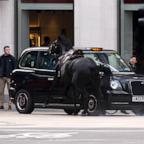Cold Case: Missing Boy's Body Found in an Ice Chest
Authorities name boy's father as primary suspect in 6-year-old case.
July 23, 2010— -- Texas homeowners stumbled upon a cooler in their attic emitting a suspicious smell as they installed a ceiling fan.
Their discovery Monday finally may solve the six-year-old missing child case of Miguel Angel Nunez.
Police in Amarillo, Texas, were called to the home to investigate the ice chest, and upon opening the cooler found the remains of what appeared to be a small child. The body looked as if it had been in the cooler for a long time, but was not completely decomposed.
"I could see the hair on the skull," said Lt. Gary Trupe of the Potter-Randall Special Crimes Unit of the Amarillo Police Department.
Preliminary results of an autopsy returned Tuesday indicated the remains were those of a small child. After receiving confirmation that it was the body of a young boy, Trupe said the police grew confident that the remains were those of Miguel.
"We're very confident it is," Trupe told ABCNews.com. "That was the house they lived in, and the place he was reported missing from originally."
Miguel Nunez was born in 2003 and has been missing since 2004, according to police.
His mother left her young son in the custody of his father while she served jail time for a misdemeanor offense. When she got out of jail, the husband said the boy was staying with relatives in Mexico, but he has not been seen since.
Police have identified the boy's father, Robert Nunez, as the primary and only suspect in the case.
After a three-day search, authorities arrested Nunez on a traffic warrant in Borger, Texas. According to police, Nunez provided a false name and resisted arrest.
It was not immediately clear if Nunez had retained a lawyer.
Nunez is being held on a felony charge of aggravated perjury because this latest development seems to conflict with testimony he gave before a grand jury in 2009.
"Information had been given by his dad that the boy was in several places," Trupe said.
"At first we could find no signs of foul play," Trupe said, "and this is where it's led us to now."




